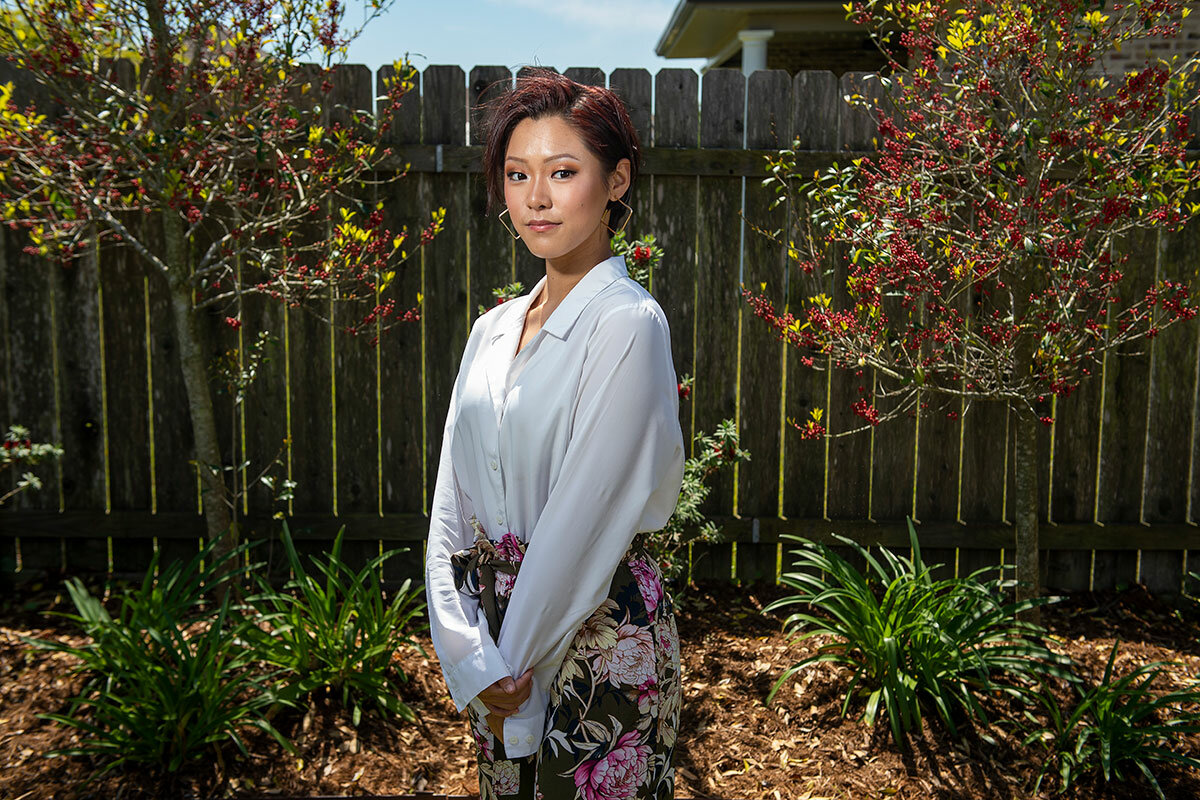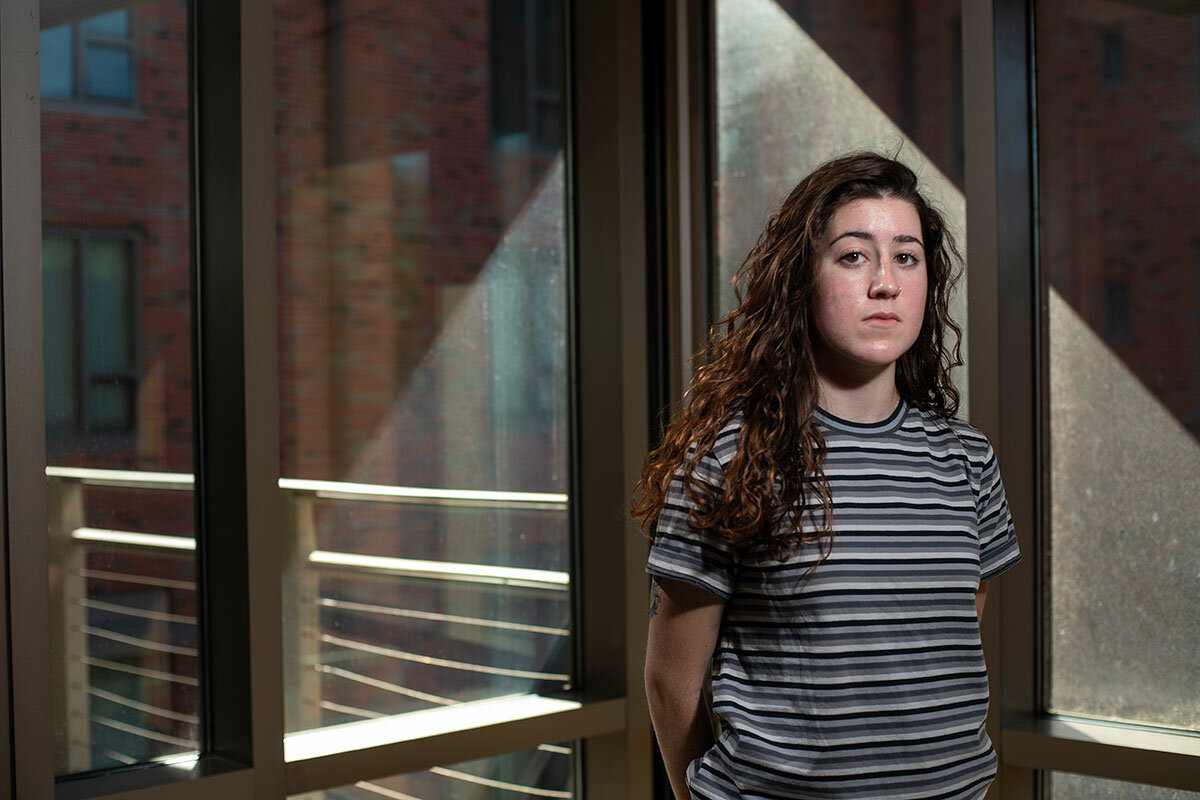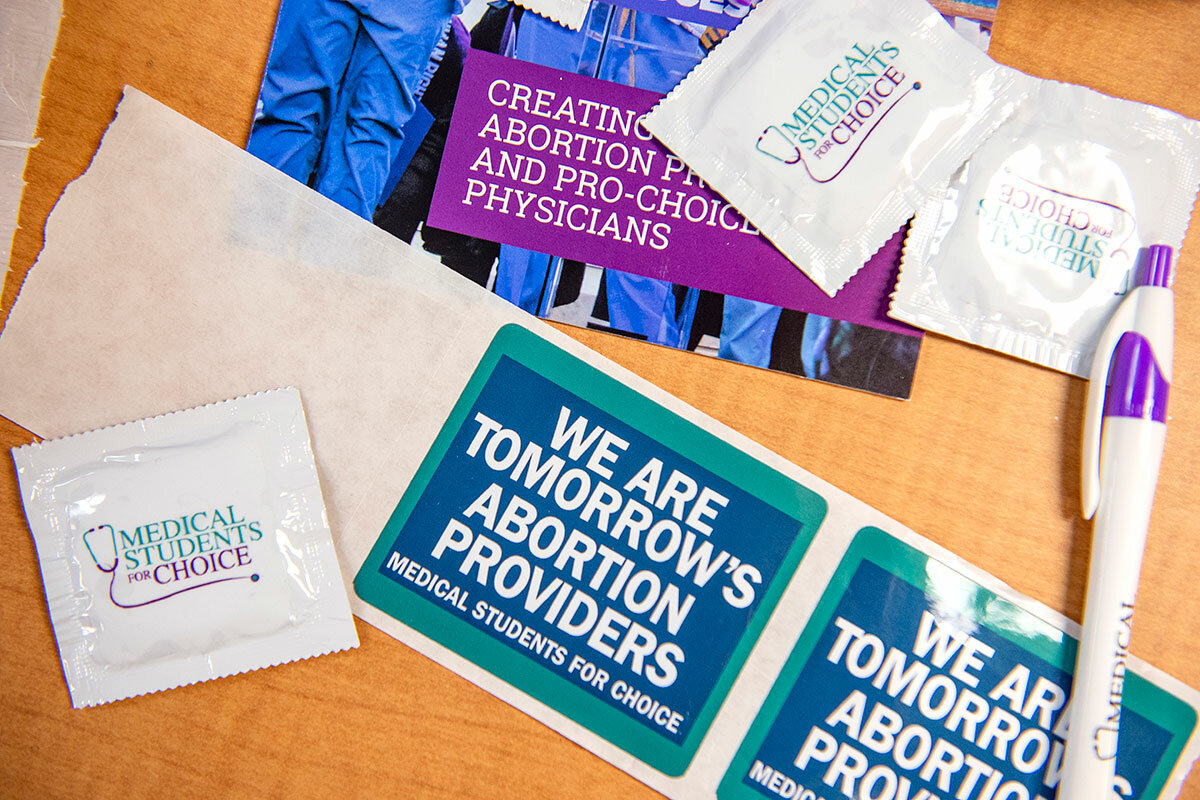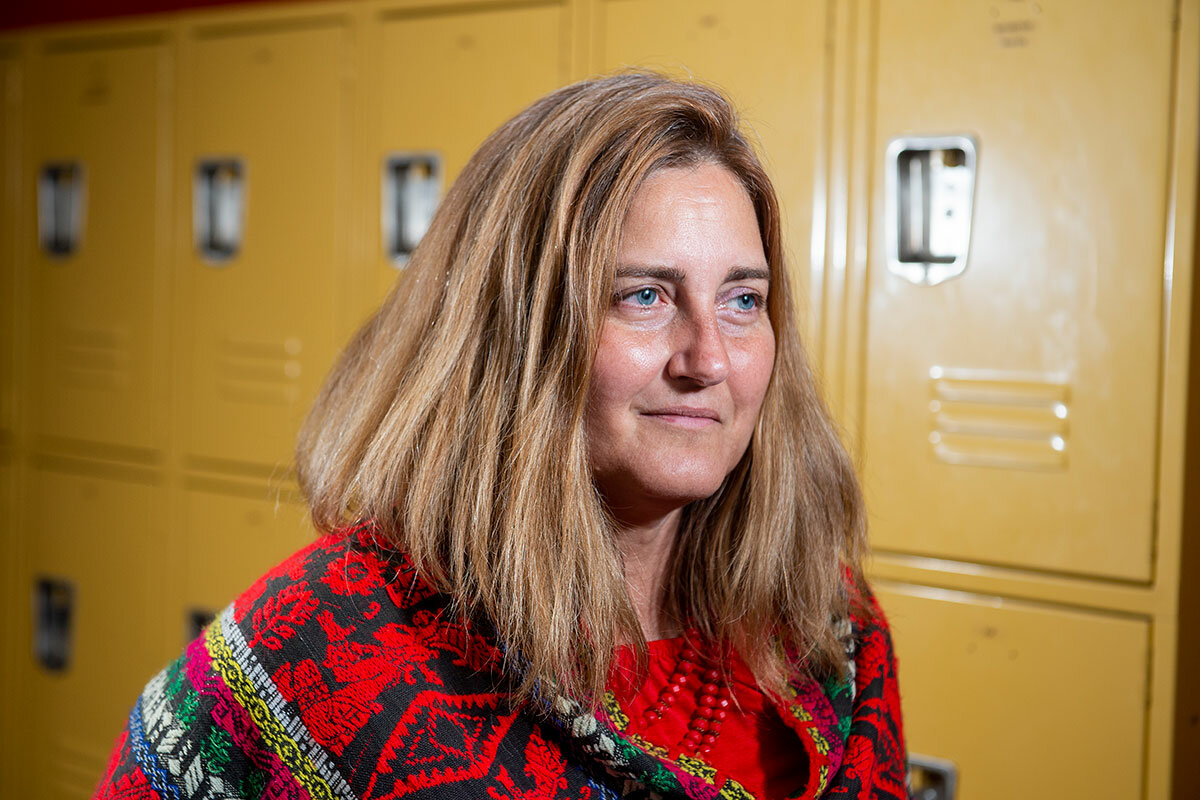Abortion wars: In Louisiana, softer tone paves way for sharp restrictions
Loading...
| HAMMOND, LA.
Most Saturdays, college freshman Taylor Gautreaux rolls out of bed just after 6 a.m., puts on something carefully neutral – no slogans or religious symbols – and drives about 45 minutes from her dorm in Hammond, Louisiana, to Baton Rouge.
On those mornings, Ms. Gautreaux joins a group that gathers just outside the property lines of Delta Clinic, a squat brick building off Goodwood Boulevard on the city’s west side. Sometimes she arrives to find the place empty. Other times women have already lined up, waiting for one of the last three abortion clinics in the state to open its doors.
Ms. Gautreaux’s job is to talk these women out of going inside. She keeps her voice low, avoiding words like “God” or “hell.” She tells the women – and their partners or mothers, whomever they’re with – that she understands they’re in a difficult spot. But do they realize what they’re getting into, she asks, what the science says about what happens when a woman ends a pregnancy? Do they know there are resources to help them so they don’t have to kill their child? Ms. Gautreaux tells them there’s a center with those resources right next door.
Why We Wrote This
As more states severely restrict abortions, it’s worth understanding how they got there. In Louisiana, antiabortion activists emphasize the well-being of the woman and the fetus – and are reaping dividends. Part Three in our series, "Looking past Roe."
“We don’t want to scrutinize a woman,” she says. “We don’t talk bad about the abortionist. We recognize their humanity, just as much as we recognize the humanity of the unborn.”
Ms. Gautreaux is the type of young activist – articulate, well-trained, and utterly sincere – who has helped take the antiabortion movement to the brink of achieving its long-term goal of overturning Roe v. Wade, the 1973 Supreme Court ruling that legalized abortion in the United States. For years groups like Louisiana Right to Life, where Ms. Gautreaux volunteers, have trained advocates to frame their cause as a human rights campaign that considers the well-being of both the fetus and the mother. This approach, in contrast to the violence and religious hysteria that marked the movement in the 1980s and ’90s, adopts the languages of social justice and science.
And it’s been mostly successful. Over the past two decades, antiabortion activists have helped push state legislatures to pass hundreds of measures restricting the procedure in anticipation of a Supreme Court case that could lead to Roe’s repeal. Just this week, Louisiana lawmakers took another step toward passing a bill that would make abortion illegal after six weeks of pregnancy. The same day, the governor next door, in Alabama, signed a law that would ban abortion almost entirely in that state, subjecting doctors who perform them to prosecution and leaving no exceptions for rape or incest.
The Alabama law is so strict it has little chance of being upheld in court, and even some conservatives have expressed concern that it’s too extreme. At the same time, abortion rights advocates are pushing back, with states like New York and Virginia passing their own measures to protect the right to abortion in case Roe is overturned.
But in Louisiana, where a brand of socially conscious religious conservatism aligns many Democrats and Republicans against abortion, the twin approaches of compassionate rhetoric and bipartisan lawmaking have been highly effective for abortion opponents.
Along with the six-week bill making its way through the legislature, the state mandates counseling for women seeking an abortion, a 24-hour waiting period between counseling and when the abortion is performed, and physician licensing requirements for anyone who performs the procedure. In April, the legislature passed the “Love Life Amendment,” which, if approved by voters via ballot in the fall, would change the state constitution to say there is no right to an abortion and taxpayer dollars cannot be used to fund the procedure.
The Supreme Court is expected next term to take up another Louisiana law, Act 620, which would require that doctors who perform abortions have admitting privileges at a hospital within 30 miles of the clinic. Opponents say the law could reduce the number of doctors performing abortions to as few as one, and the court issued a temporary stay in February blocking the law from going into effect. But many court observers believe the measure could wind up playing a pivotal role in an incremental overturning of Roe.
“Our goal is twofold: to make abortion illegal and to make it unthinkable,” says Alex Seghers, education director for Louisiana Right to Life. “Louisiana looks very successful compared to the rest of the country.”
A women-centered strategy
Ms. Gautreaux, who’s studying to be a teacher at Southeastern Louisiana University (SLU) in Hammond, where she grew up, discovered activism while researching abortion for a psychology class her senior year of high school. Like many Louisianians, she’s a devout Roman Catholic and was drawn to the idea of applying her faith in the service of what she sees as the most vulnerable humans. She got in touch with Alex Seghers, then director of Louisiana Right to Life’s youth program. Ms. Seghers invited Ms. Gautreaux to a training camp for teenagers interested in learning about abortion and other issues, like bioethics and euthanasia.
Ms. Gautreaux went to her first PULSE Immersion Weekend in February 2018. Over two days, she heard lectures about the different ways abortion is performed, the purported side effects, and the moral arguments against the procedure. She attended workshops on how to convince others that “the unborn” is a person and how to dispute arguments by abortion rights supporters. She took part in dialogue exercises, including one called “trot out the toddler.”
“Say a woman gets pregnant. She has her baby, and the baby’s around 2 or 3 years old, and all of a sudden [the woman] loses her job,” Ms. Gautreaux explains during a conversation this spring at SLU’s Catholic student center. “You would ask the person who’s pro-choice … ‘Would it be morally permissible for her to kill her toddler?’”
After that weekend, Ms. Gautreaux attended the PULSE weeklong Leadership Institute, held in June, and soon was staffing PULSE weekends herself. When she started college in the fall, she joined the campus pro-life club, where’s she’s now vice president. “I’m super active,” she says. “That’s probably the biggest part of my life.”
PULSE is a study in the so-called new rhetorical, or women-centered, strategy developed in the late ’90s by physician and antiabortion activist David Reardon. Until about 2015, the program was known as Camp Joshua, a name still used by some Right to Life affiliates in other states. But the Louisiana chapter wanted to drop the biblical theme and make the camp more inclusive to students who opposed abortion but weren’t religious. They left behind the giant crucifixes and gruesome photos, recognizing that fear and guilt were unlikely to change anyone’s minds.
They instead developed arguments based on material used by proponents of the women-centered strategy – for instance, that abortion not only harms the fetus but is also linked to depression, post-traumatic stress, and infertility as well as increased risk of breast cancer, which all are claims that the American College of Obstetricians and Gynecologists has flatly refuted. Advocates are encouraged to support women at whatever stage of their decision.
“Being in the pro-life movement requires not only a knowledge of the unborn, abortion, and the trauma of abortion, but also compassion, coming from a nonjudgmental place,” says Mia Bordlee, the new youth programs director at Louisiana Right to Life.
It’s a powerful framework that draws young people to the cause. Claire Seymour, a high school junior who’s been involved with Louisiana Right to Life since she was in eighth grade, keeps a big binder of the pamphlets and handouts she’s received from her PULSE weekends. “Every few nights I just go back to it and refresh my memory,” she says from the patio of her parents’ home in Luling, just outside New Orleans. Like Ms. Gautreaux, Ms. Seymour’s personal story contributed to her activism: her parents adopted her from a young single mother in Daejeon, South Korea, when she was about six months old.
“What if she’d decided not to keep me?” Ms. Seymour asks. “I want to make sure that if a woman is going through that type of crisis that she has a place to feel comforted that is not in an act of violence such as abortion.”
Reproductive justice
Kameron Kane also spends a lot of her time outside an abortion clinic. Not in Baton Rouge, though; Ms. Kane is a junior at Tulane University in New Orleans. Her stomping ground is the Women’s Health Care Center, a nondescript building on General Pershing Street, about a mile and a half from campus. But unlike Ms. Gautreaux, Ms. Kane isn’t trying to steer women away from the clinic. She’s there as a clinic escort, to make sure the women can get inside safely with as little harassment from protesters as possible.
With only three left in the state – down from 11 in 2000 – abortion clinics in Louisiana are easy targets for protesters. Some come from as far as Texas or Mississippi, looking for a place to strike. And although groups like Louisiana Right to Life have embraced a less confrontational approach to their advocacy, plenty of others still prefer the old aggressive tactics.
“As the women enter the clinic, these people like to shout things,” Ms. Kane says, frustration creeping into her voice. “‘Why are you killing me, Mommy?’ ‘Why would you do this to me?’”
“They will do everything in their power to ensure women don’t go into the clinic.”
Ms. Kane, who grew up in the Philadelphia suburbs, began volunteering as a clinic escort as a freshman. She’d heard about the operation via the New Orleans Abortion Fund (or NOAF, rhymes with “loaf”), a local nonprofit that raises money for women who can’t afford an abortion. The work suited her: She’d discovered a passion for social justice in high school when she’d watched from afar, online, as protests erupted after the death of Michael Brown at the hands of police in Ferguson, Missouri.
Last fall, a year into her volunteer work, Ms. Kane learned that the Newcomb College Institute, Tulane’s center for women’s leadership, had a program that placed students as interns at community groups working on reproductive issues.
The program is grounded in the concept of reproductive justice, a term coined in 1994 by a group of African American women who felt that the women’s rights movement tended to address only the needs of its leaders, who were mostly white and middle class. They wanted to create their own campaign, one that recognized the links between race, gender, and sexual orientation and the resources, education, and opportunities that determine whether or not women have a real choice in their reproductive lives.
Along with clinic escorting, Ms. Kane does canvassing: standing on city sidewalks, handing out postcards with information on economic justice and abortion access, trying to get people to talk about reproductive rights and health.
The work, while edifying, is also draining, she says. Ms. Kane recalls coming home after two hours of facing down a particularly vocal group of protesters at Women’s Health. “I had to just sit down and take a breath,” she says. “It takes a toll on you as a person.”
“It’s rewarding, and empowering,” she adds, “but at the same time, incredibly frustrating that we even have to be out there.”
A tale of two movements
Amy Irvin’s smile carries the weight of the work week when she sits down to chat late in the day on a Friday. She runs NOAF, which she co-founded in 2012, out of a co-working space in northeast New Orleans. Her office is crammed with the trappings of a life of protest marches and fundraisers: snarky signs, colorful costumes, pink hats.
Ms. Irvin has a soft spot for the Newcomb program. Students are the lifeblood of NOAF, she says; without them the organization would have folded long ago. “They were the very first volunteers with our hotline” – where women can call about anything from information on abortion to financial assistance – “and were really part of that very beginning advocacy work that we did,” she says. The internship, which started a few years after NOAF was founded, formalized the relationship.
Compared to PULSE, the program is far less structured and intensive. Newcomb takes about 10 students a semester, whereas the last PULSE weekend had about 40. Those who work as clinic escorts are taught to avoid engaging with protesters and to keep their emotions in check. There’s also some training around how to have constructive dialogue. (“You know: ‘What you said was racist’ versus ‘You are a racist,’” Ms. Kane explains.) But Newcomb interns are assigned to different organizations, whose needs determine what each student learns. There’s no unified approach, no single goal summed up in a slogan.
Which, in many ways, mirrors the disparity between the two movements in states like Louisiana.
Where Louisiana Right to Life has a national network and strategy to draw on, groups like NOAF and Lift Louisiana – a New Orleans-based nonprofit that educates, advocates, and litigates around reproductive justice issues – are largely working on their own. These organizations juggle providing their usual services with time in Baton Rouge, testifying against as many antiabortion measures as they can afford to. The state solicitor general is right now defending 30 abortion laws and hundreds of lawsuits in court. Six more have been introduced in the current legislative session, which started in April. Even Planned Parenthood, with its broad network, struggles here; the organization is currently tangling with the state Department of Health over a permit to perform abortions in Louisiana.
“None of the organizations working on this issue here in Louisiana have much capacity,” Ms. Irvin says tiredly. “It’s a loosely knit group trying to do a lot.”
With the 2020 election supercharging the debate, however, the stakes over abortion seem higher than ever. Activists on both sides are looking ahead to the day when a case that could lead to Roe’s repeal lands in the Supreme Court. But they recognize that won’t be the end – far from it.
“You can change the law all you want,” Ms. Gautreaux back in Hammond says. “But until we change people’s hearts and minds and educate them compassionately on the issues, we’re not going to see an end to abortion in the United States.”
Ms. Kane dreams of someday using a biomedical engineering degree to advance reproductive health technology and research. And Ms. Irvin – along with raising funds for NOAF, working with students, and testifying before lawmakers at the capitol – is trying to promote women’s stories via a weekly radio program called Pro Frequency.
“I feel proud that we’re still at this,” she chuckles. “I don’t know if anyone thought we would still be around.”
Staff writer Samantha Laine Perfas produced the audio and contributed to this report.










